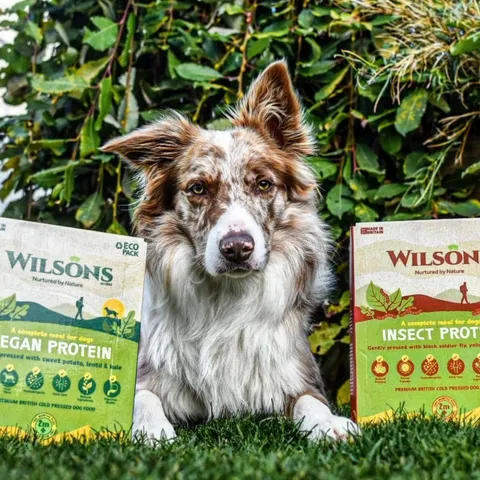When your beloved canine companion falls ill, their usually robust appetite might diminish, leaving you concerned about their well-being. Much like humans, dogs often lose interest in their regular food when feeling under the weather or experiencing an upset stomach. Knowing What To Give Sick Dog To Eat is crucial, as providing the right nutrition can significantly aid their recovery, boost energy levels, and soothe their digestive system.
This guide, brought to you in partnership with We Love Doodles, outlines nutritious and easy-to-digest food options for dogs experiencing illness, from temporary stomach upsets to ongoing allergies. We’ll explore ten veterinarian-approved foods that can help your four-legged friend bounce back to their energetic self. Remember, while these suggestions are generally safe and beneficial, persistent sickness warrants a consultation with your veterinarian for personalized advice. It’s always a good idea to have some healthy options on hand for those unexpected turns in your dog’s health. You might also want to explore what are foods that dogs can’t eat to ensure your dog avoids anything harmful.
What to Feed a Sick Dog for Upset Stomachs
When a dog is sick, a plain, bland diet comprised of easily digestible and nutritious foods is often the most effective approach. This helps to settle their stomach without overloading their system. Below are ten excellent options that are gentle on your dog’s digestive system while providing essential nutrients to support healing.
1. Boiled White Meat
Lean white meats like chicken or turkey are often the top recommendation for sick dogs due to their easy digestibility and low-fat content. Chicken or turkey breast provides excellent lean protein, which is vital for recovery without irritating a sensitive stomach. Always ensure to remove any skin or bones before feeding to prevent choking hazards and ease digestion.
To prepare, rinse the meat thoroughly under cold water, remove excess fat, skin, or bones, and place it in a pot covered with water. Bring to a boil, then reduce heat and simmer for 15-20 minutes until fully cooked. Drain the water, cut the meat into small, bite-sized pieces for easier consumption, and allow it to cool before serving alone or mixed with other bland foods like white rice.
2. White Rice
White rice is a staple in many dog foods and serves as an excellent, easily digestible carbohydrate source for sick dogs. While brown rice offers more nutrients, its blandness makes white rice a safer option for sensitive stomachs. It’s a perfect complement to boiled chicken or turkey.
 Collie looks longingly up at its bowl
Collie looks longingly up at its bowl
Furthermore, if your dog is experiencing diarrhea, white rice can help bind their stools, assisting their digestive system in returning to normal function. To prepare, rinse the rice under cold water, add it to a large pan with two parts water to one part rice, and bring to a boil with a generous pinch of salt. Reduce to a simmer, cover, and cook on low heat for about 18 minutes until all water is absorbed. Let it rest and cool, then fluff with a fork and serve.
3. Sweet Potatoes
Plain, cooked sweet potatoes are a fantastic choice for dogs with upset stomachs due to their richness in vitamins and fiber, along with their gentle nature on the digestive tract. They supply essential calcium, iron, and magnesium, contributing significantly to your dog’s overall health and recovery.
It is crucial never to feed your dog raw sweet potatoes, as they are tough to digest and could exacerbate stomach issues. Instead, peel the skins, chop the potatoes into chunks, and boil them in water until soft. Once cooked, drain and mash them thoroughly, allowing them to cool completely before offering them to your dog.
4. Pumpkin
Similar to sweet potatoes, pumpkins are highly effective in soothing an upset stomach and improving the condition of a sick dog. They are packed with vitamins that strengthen the immune system and are rich in fiber, which helps regulate digestion.
 Husky with a pumpkin slice smile
Husky with a pumpkin slice smile
You can offer your dog up to four tablespoons of plain pumpkin with their regular meal or alongside other bland foods like chicken and rice to aid in their recovery. Canned pumpkin is just as effective as fresh, provided it contains no added sugar, spices, or other seasonings. Always avoid pumpkin pie filling, as these additives can further upset your dog’s stomach. For a more comprehensive understanding of what not to feed your dog, consider reading what food dogs can’t eat.
5. Homemade Bone Broth
Bone broth is a nourishing option for sick dogs, offering vital nutrients and minerals like sodium and potassium, while also promoting hydration. Its low carbohydrate content makes it an excellent, gentle, and easy-to-digest choice for dogs with upset stomachs.
When preparing bone broth, avoid using garlic or excessive salt, as these ingredients can worsen your dog’s condition. To make it, add beef or pork marrow bones and chicken or turkey bones to a large cooking pot. Cover them with a few inches of water and cook on low heat for 20-24 hours. After cooking, strain the liquid to remove all bones before serving the nutrient-rich broth.
6. Baby Food
For puppies struggling with stomach upset, stage 2 meat-based baby foods, such as chicken, lamb, or turkey purees, can be an effective and gentle feeding choice. These foods are designed to be easy to chew and digest, making them suitable for sensitive puppy stomachs and cases of diarrhea.
 Doodle puppies eat from a plate
Doodle puppies eat from a plate
However, it is crucial to carefully check the ingredients list to ensure there are no additives or components potentially toxic to dogs, such as garlic or onion powder. If you are ever unsure about the safety of certain baby food ingredients, always consult your veterinarian for guidance. This is especially important for puppies, as what food is bad for puppies can differ slightly from adult dogs.
7. Fish
Fish is an exceptional source of healthy fats and essential vitamins, which can significantly boost your dog’s immune system and overall health when they are recovering from illness. The naturally strong aroma of fish can also be particularly enticing, helping to stimulate your dog’s appetite if they have been reluctant to eat.
The best method for preparing fish for your dog is poaching. Similar to boiling chicken, add the fish to a pan of water, bring it to a boil, then reduce the heat and simmer for 10-15 minutes until it is thoroughly cooked. Before serving, carefully remove all bones and break the fish into small, easily manageable pieces.
8. Oatmeal
Plain, cooked oatmeal, made from rolled oats, can provide considerable relief for a dog with an upset stomach. Rich in fiber, it aids in alleviating constipation and contains antioxidants that are beneficial for reducing stomach inflammation.
While oatmeal is a healthy option, moderation is key. Its high fiber content means that too much could potentially exacerbate stomach discomfort. Therefore, introduce it sparingly to ensure it helps rather than hinders your dog’s recovery.
9. Yogurt
Plain yogurt, specifically varieties that are full of probiotics and free from any added sweeteners or artificial ingredients, is an excellent food choice for a dog experiencing an upset stomach. The probiotics support digestion and promote a healthy gut microbiome, which is vital for recovery.
 Puppy with yoghurt in its beard
Puppy with yoghurt in its beard
For dogs with constipation, plain natural yogurt can help regulate their digestive system. It’s readily available in most grocery stores, making it a convenient option for sudden illnesses. As an added bonus, it can even be frozen and served as a cooling treat on a warm day.
10. Eggs
Provided your dog is not actively vomiting, eggs are an ideal food choice for a sick pet. They are gentle on the stomach and provide a rich source of high-quality protein, which is essential for rebuilding strength and supporting healing. Eggs are also an excellent energy booster, perfect for dogs feeling a bit lethargic after an illness.
The best ways to prepare eggs for your sick dog are scrambled without butter or oil, or simply boiled. These methods ensure they are as gentle as possible on their delicate digestive system. However, if your dog is vomiting, it’s best to avoid eggs completely until their stomach has settled. You might also want to review what food should I not feed my dog for general guidance.
What to Feed a Dog with Allergies or Sensitive Stomachs
If your dog frequently experiences upset stomachs or recurrent sickness, it may indicate underlying food-related or breed-specific allergies. Consulting your vet is highly recommended to diagnose any such sensitivities. While conventional kibble can sometimes be problematic for sensitive dogs, specialized food options are designed with digestive health in mind.
Cold Pressed Dog Food
Cold pressed dog food offers a beneficial alternative to traditional kibble, especially for dogs with food-related allergies or sensitivities. This type of dry food undergoes minimal processing at significantly lower temperatures compared to conventional kibble, which helps to preserve a greater nutritional value.
Because of its unique manufacturing process, cold pressed dog food breaks down easily in the digestive system, making it ideal for sensitive stomachs. It is formulated to support improved overall health and aids digestion, breaking down at a similar rate to raw food, which means it can be safely fed alongside a raw diet. Available in various flavors, including white fish, salmon, and chicken, cold pressed food is an excellent choice for maintaining your dog’s happiness and health. Many ranges also include grain-free options, perfect for dogs with grain allergies, providing them with nutrient-dense food that won’t upset their tummies.
Insect Protein Cold Pressed Dog Food
Complete and nutritionally balanced, insect protein cold pressed dog food is crafted using the same low-temperature pressing method as meat protein varieties, ensuring maximum nutrient retention and aiding digestion. This innovative food source is a sustainable and highly beneficial option for dogs with specific sensitivities.
 Collie dog with Wilsons Insect Protein Food
Collie dog with Wilsons Insect Protein Food
Insects are a superior source of protein, often containing more protein than chicken or beef, ensuring your dog receives all essential nutrients. Moreover, insects are naturally hypoallergenic and low in purines, making them an ideal food for dogs with sensitivities or allergies to traditional meat proteins. Like other cold pressed options, this range breaks down easily and can be fed alone or as part of a raw food diet.
Raw Frozen Dog Food
For fussy eaters or dogs with sensitivities to their current kibble, transitioning to raw food can be an excellent dietary change. Raw dog food is typically made from natural, minimally processed ingredients and is often grain-free, which can significantly aid digestion and enhance coat, skin, and overall health.
Raw food usually comes in various formulations, such as an 80/10/10 mix (80% meat, 10% offal, 10% bone) or a 70/10/10/10 mix (with added vitamins and minerals). These options provide the flexibility to mix with your own vegetables or supplements, allowing you to tailor your dog’s diet precisely to their specific needs and allergies. This personalized approach makes it easier than ever to cater to your dog’s unique dietary requirements. For further insights on supportive diets, you can find more information on what can you give a sick dog to eat.
Conclusion
Caring for a sick dog requires patience and a thoughtful approach to their diet. Providing bland, easily digestible, and nutritious foods can make a significant difference in their recovery and comfort. Whether it’s a temporary upset stomach or a chronic allergy, knowing the right options, from boiled chicken and white rice to specialized cold pressed or raw diets, empowers you to support your furry friend’s health. Always remember that these recommendations serve as general guidance. If your dog’s condition doesn’t improve, or if their symptoms worsen, it is essential to consult your veterinarian for professional medical advice. A healthy diet is a cornerstone of a happy dog’s life. Explore more articles on Dog Care Story for comprehensive pet care tips!
